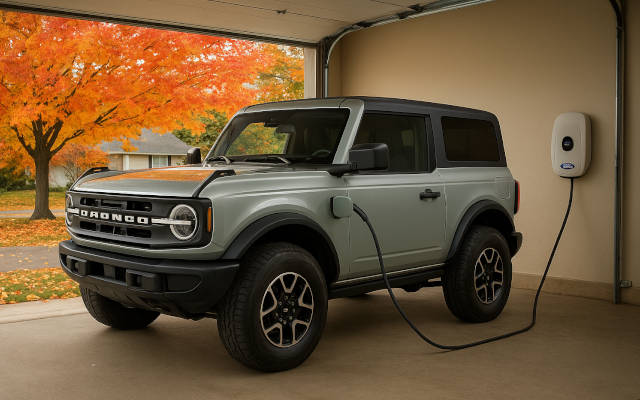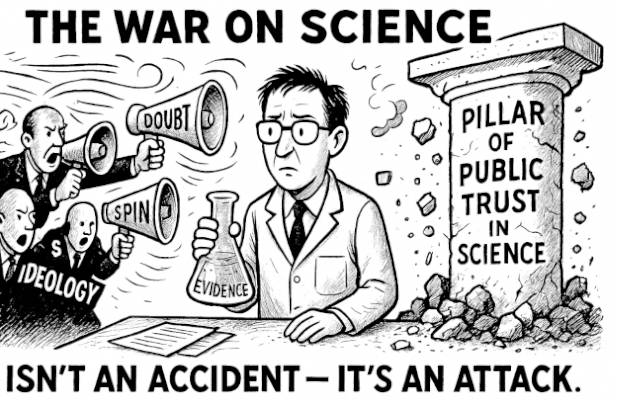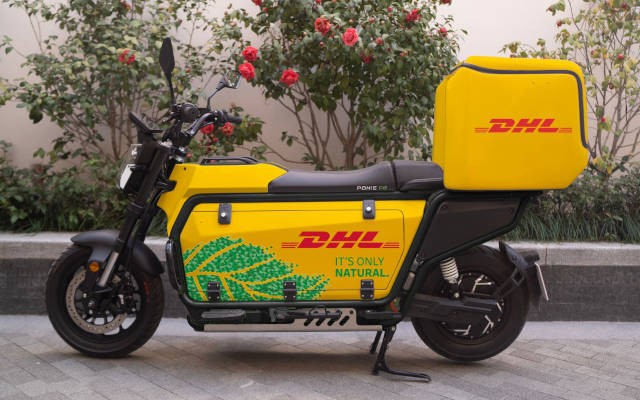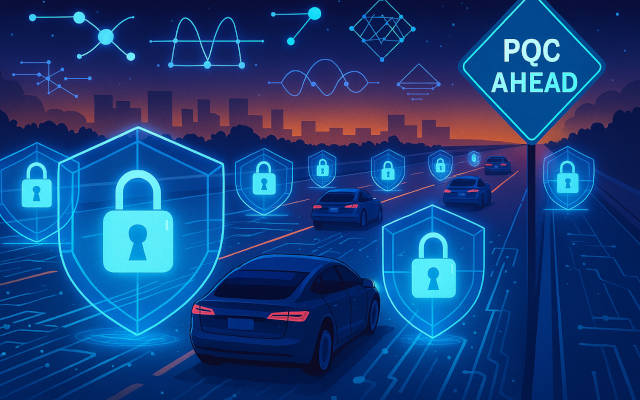 EDITOR'S PICK
EDITOR'S PICK
Ford Faces EV Crossroads as Federal Incentives Expire
02 Oct 2025 | Synopsis
 Ford CEO Jim Farley warns that U.S. EV sales could drop by half following the expiration of the $7,500 federal tax credit, citing high vehicle costs and reduced consumer demand. Ford is shifting focus to hybrids and more affordable EVs, while some dealers see the change as a chance to test market strength without subsidies. The industry faces uncertainty as it adapts to a post-incentive landscape.
Ford CEO Jim Farley warns that U.S. EV sales could drop by half following the expiration of the $7,500 federal tax credit, citing high vehicle costs and reduced consumer demand. Ford is shifting focus to hybrids and more affordable EVs, while some dealers see the change as a chance to test market strength without subsidies. The industry faces uncertainty as it adapts to a post-incentive landscape.The LNG Detour: What Scotland's New Ferry Teaches US
02 Oct 2025 | Synopsis
 Scotland's Glen Sannox ferry, launched as a “green” LNG-powered vessel, emits more greenhouse gases than its diesel predecessor due to underestimated methane slip. Despite improved local air quality, real-world data shows LNG's climate impact is worse over short timeframes. The project highlights how optimistic assumptions and delayed construction turned a sustainability effort into a cautionary tale about transitional fuels and lifecycle emissions.
Scotland's Glen Sannox ferry, launched as a “green” LNG-powered vessel, emits more greenhouse gases than its diesel predecessor due to underestimated methane slip. Despite improved local air quality, real-world data shows LNG's climate impact is worse over short timeframes. The project highlights how optimistic assumptions and delayed construction turned a sustainability effort into a cautionary tale about transitional fuels and lifecycle emissions.The Current War On Science, Who's Behind It And Why
02 Oct 2025 | Synopsis
 Science Under Siege asserts the undermining of science is not accidental but largely driven by ideological, economic, and political forces. It points fingers at special interests, political actors, and media amplifying doubt for gain. It also critiques how scientists themselves sometimes contribute by failing to communicate clearly or by letting funding and institutional pressures interfere with objectivity. The result: erosion of public trust, polarized discourse, and weakened science-based policy.
Science Under Siege asserts the undermining of science is not accidental but largely driven by ideological, economic, and political forces. It points fingers at special interests, political actors, and media amplifying doubt for gain. It also critiques how scientists themselves sometimes contribute by failing to communicate clearly or by letting funding and institutional pressures interfere with objectivity. The result: erosion of public trust, polarized discourse, and weakened science-based policy.PNY Electric Cargo Scooter Completes Successful Multi-Location Last-Mile Delivery Trials
01 Oct 2025 | Synopsis
 PNY's Ponie P2, the world's first electric cargo motorcycle, completed successful trials across Tel Aviv, Milan, and other urban locations with partners like DHL and postal services. Manufactured in Israel, the P2 features a top speed of 100 km/h, high payload capacity, modular cargo options, and a 160 km range. Compared to gas-powered delivery vehicles used by Wolt - a Finnish delivery platform - it offers lower fuel and maintenance costs, making it a cost-effective, zero-emission solution for last-mile logistics.
PNY's Ponie P2, the world's first electric cargo motorcycle, completed successful trials across Tel Aviv, Milan, and other urban locations with partners like DHL and postal services. Manufactured in Israel, the P2 features a top speed of 100 km/h, high payload capacity, modular cargo options, and a 160 km range. Compared to gas-powered delivery vehicles used by Wolt - a Finnish delivery platform - it offers lower fuel and maintenance costs, making it a cost-effective, zero-emission solution for last-mile logistics.Post-Quantum Security and the Electric Car: What Drivers Need to Know
01 Oct 2025 | Synopsis
 Post-quantum security protects electric vehicles from future quantum threats that could break current encryption. As EVs rely on secure software updates, telemetry, and identity systems, automakers are adopting quantum-resistant algorithms. With NIST's 2024 standards and cloud providers piloting migration, the shift is underway to safeguard long-lived vehicles and data. Drivers may not notice, but it's vital for safety and trust.
Post-quantum security protects electric vehicles from future quantum threats that could break current encryption. As EVs rely on secure software updates, telemetry, and identity systems, automakers are adopting quantum-resistant algorithms. With NIST's 2024 standards and cloud providers piloting migration, the shift is underway to safeguard long-lived vehicles and data. Drivers may not notice, but it's vital for safety and trust.
 EVWorld Exclusive
EVWorld Exclusive
Carbon Neutral Summit 2025 Preview - The Hard Questions Automakers Must Answer
01 Nov 2025 |  The EMEA Automotive Carbon Neutral Summit 2025 will confront the gap between ambition and execution. Automakers must scale low‑carbon technologies, decarbonize sprawling supply chains, and secure renewable energy for factories and charging networks. Executives will push for clear policy, carbon pricing, and stable investment signals. Circular economy practices and global competition add urgency. The challenge: make carbon neutrality practical, profitable, and fast enough to meet climate goals.
The EMEA Automotive Carbon Neutral Summit 2025 will confront the gap between ambition and execution. Automakers must scale low‑carbon technologies, decarbonize sprawling supply chains, and secure renewable energy for factories and charging networks. Executives will push for clear policy, carbon pricing, and stable investment signals. Circular economy practices and global competition add urgency. The challenge: make carbon neutrality practical, profitable, and fast enough to meet climate goals.
Can Food Waste Fuel America's Skies? The Promise And Pitfalls Of Trash-To-JetA
01 Nov 2025 |  Scientists are developing ways to turn America's massive food waste stream into sustainable aviation fuel. Using processes like hydrothermal liquefaction, discarded scraps can be converted into biocrude and refined into jet-ready fuel. At full scale, it could replace only a fraction of U.S. daily jet fuel demand, but it would cut landfill methane and diversify supply. Major hurdles remain: costly collection, dispersed feedstock, certification, and economics compared to fossil fuel.
Scientists are developing ways to turn America's massive food waste stream into sustainable aviation fuel. Using processes like hydrothermal liquefaction, discarded scraps can be converted into biocrude and refined into jet-ready fuel. At full scale, it could replace only a fraction of U.S. daily jet fuel demand, but it would cut landfill methane and diversify supply. Major hurdles remain: costly collection, dispersed feedstock, certification, and economics compared to fossil fuel.
Can Coal Power the AI Boom? Wyoming's Bet on a Fading Fuel
01 Nov 2025 |  Wyoming's coal is being promoted as vital for powering the AI boom, but the market reality tells another story. Utilities continue retiring coal plants as cheaper wind, solar, and natural gas dominate. Lease auctions draw little interest, and even China is pairing coal with massive renewable growth. Analysts warn AI demand may be overstated, leaving coal an expensive detour. The conclusion: coal is unlikely to fuel America's AI future.
Wyoming's coal is being promoted as vital for powering the AI boom, but the market reality tells another story. Utilities continue retiring coal plants as cheaper wind, solar, and natural gas dominate. Lease auctions draw little interest, and even China is pairing coal with massive renewable growth. Analysts warn AI demand may be overstated, leaving coal an expensive detour. The conclusion: coal is unlikely to fuel America's AI future.
America's Untapped Power: Why Wave Energy Still Waits For Its Moment
01 Nov 2025 |  America's waves hold vast untapped energy - enough to power over half the nation's electricity needs. Yet wave power lags behind solar and wind. Devices must survive corrosive seas and violent storms, while no single design has emerged as dominant. Developers also face years of regulatory hurdles and high costs that deter investors. New test sites like Oregon's PacWave aim to prove the technology, offering hope that wave energy can finally move from promise to reality.
America's waves hold vast untapped energy - enough to power over half the nation's electricity needs. Yet wave power lags behind solar and wind. Devices must survive corrosive seas and violent storms, while no single design has emerged as dominant. Developers also face years of regulatory hurdles and high costs that deter investors. New test sites like Oregon's PacWave aim to prove the technology, offering hope that wave energy can finally move from promise to reality.
Battle of the Boxes: Tokyo's Compact EV Showdown
30 Oct 2025 |  Three boxy EVs - BYD Racco, Nissan Sakura, and Honda Super-One - dominated the 2025 Tokyo Auto Show, each embracing Japan's kei car tradition with electric innovation. BYD eyes global markets, while Sakura and Super-One remain Japan-focused. U.S. entry would require upgrades in safety, speed, and tech. Their compact charm and urban utility signal a strategic shift in EV design - away from sleek sameness and toward character-driven mobility.
Three boxy EVs - BYD Racco, Nissan Sakura, and Honda Super-One - dominated the 2025 Tokyo Auto Show, each embracing Japan's kei car tradition with electric innovation. BYD eyes global markets, while Sakura and Super-One remain Japan-focused. U.S. entry would require upgrades in safety, speed, and tech. Their compact charm and urban utility signal a strategic shift in EV design - away from sleek sameness and toward character-driven mobility.
 01 Nov 2025 21:56:50 UTC |
RECENT PODCASTS
Tesla RoboTaxis Crash More Than Waymo - 35,000 Rivian Amazon Vans
SEARCH RSSTREAM
 60 New Postings In Past 24 Hours
60 New Postings In Past 24 Hours
Category:mobility
Region:NoAmerica
Date:01 Nov 2025
Category:energy
Region:NoAmerica
Date:01 Nov 2025
Category:mobility
Region:AsiaPacific
Date:01 Nov 2025
Category:finance
Region:Europe
Date:01 Nov 2025
Category:mobility
Region:NoAmerica
Date:01 Nov 2025
Category:mobility
Region:NoAmerica
Date:01 Nov 2025
Category:review
Region:AsiaPacific
Date:01 Nov 2025
Category:mobility
Region:NoAmerica
Date:01 Nov 2025
Category:mobility
Region:AsiaPacific
Date:01 Nov 2025
Category:policy
Region:NoAmerica
Date:01 Nov 2025
Category:policy
Region:Global
Date:01 Nov 2025
Category:policy
Region:Global
Date:01 Nov 2025
Category:energy
Region:NoAmerica
Date:01 Nov 2025
Category:policy
Region:Europe
Date:01 Nov 2025
Category:policy
Region:AsiaPacific
Date:01 Nov 2025
Category:policy
Region:IndoAsia
Date:01 Nov 2025
Category:mobility
Region:Europe
Date:01 Nov 2025
Category:policy
Region:AsiaPacific
Date:01 Nov 2025
Category:mobility
Region:AsiaPacific
Date:01 Nov 2025
Category:finance
Region:Global
Date:01 Nov 2025